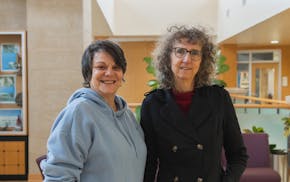Ananya Dance Theatre ventured into exciting new territory over the weekend at the O'Shaughnessy, employing satire as the dance company created a dystopian world controlled by Monsanto-like overlords.
"Roktim: Nurture Incarnadine" began on the lawn outside the auditorium by dividing audiences into different groups to be led on "tours" of the different "Pronto FeedzAll" stations that touted genetically engineered seed and farming products you might find in Margaret Atwood's "The MaddAddam Trilogy."
Though opening night brought a sprinkling of rain, the audience didn't seem to mind. There was plenty of laughter at the scary-sounding new products, illustrated by the dancers and large signs created by Seitu Jones with Lela Pierce, such as the "Squash the Fat Away Lab" (guaranteed to burn fat!) and doctored "neocorn" which you could order in your favorite color.
Following that interactive preamble, the show got started in earnest inside the theater, where the tone shifted into a more serious timbre. Annie Cady's stark set, made up of fluorescent lights in geometric shapes, set the sinister mood. The ADT dancers became seeds in a factory, working as a machine to create the unnatural new super seeds produced by the evil corporation.
The dancers looked solid, finding a cohesive, precise movement vocabulary in the group scenes. Ananya Chatterjea's unique aesthetic — a blend of classical Indian dance, yoga and martial arts — found a fresh liveliness in the agriculture sweatshop nightmare.
The work bore similarities to ADT's "Neel: Blutopias of Radical Dreaming," which premiered last year. In that piece, choreographer Chatterjea riffed off Duke Ellington's concept of "blutopia," an imagined future soaked in the blues, constructing a horrific narrative of a massacre countered with hope brought forth in the second half of the performance.
In "Roktim," Chatterjea similarly offers a counterpoint to the first half's dystopia, by having the seeds break free from their corporate chains, burning down the factory and searching for hope in the ancestral traditions and farming practices of different cultures.
While the hopeful second half offered beautiful moments, especially with the inclusion of poetry by Heid Erdrich and Diane Wilson, it might have benefited from fewer scenes, as it felt at times like an overly long denouement to the thrilling beginning.
The satirical edge of the beginning offered such a fresh departure in the company's repertoire, it begged further exploration. It would have been interesting to see the company push that even further.
Sheila Regan is a Minneapolis writer.
